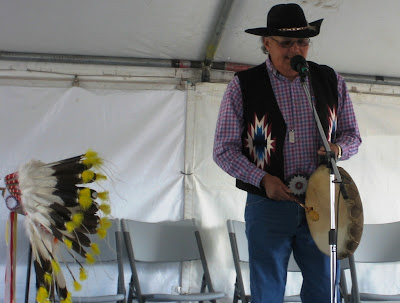My wife (Jan Munday) & I were there every day for the whole time, including “after hours” (past midnight) at the former YMCA/MoFAB where Chad Okrusch, David Hobbs, and other local talents played. We drank a lot of beer, danced our asses off, met folks from all over, and were so exhausted that we piled into bed last night before 9 p.m. and slept a solid ten hours.
The premiere venue was the stage at the Original Gallows Frame & Mineyard. Here's a view of the gallows frame (aka headframe), silouhetted by the clear blue sky that graced us each day, and by the East Ridge of the Continental Divide (by clicking on the photo, it should enlarge so that you can also see the Their Lady of Our Rockies statue on the ridge to the left of the headframe):

What a cool stage, built onto the base of the gallows frame (and with a 3500 foot deep shaft below it):

Build it and they will come. My best guess is about 20,000 people, most from nearby Montana (Butte is only 15 minutes from Montana), and many from neighboring states such as Idaho, Washington, and Wyoming. Here's a view of the crowd at the Original Mineyard:

There were 7 stages in play, with 27 musical groups in more or less constant performance at each stage. Saturday there was music from noon to 10:30 p.m., followed by after hours until 2 a.m. at the MoFAB. The music was widely inclusive, including performers from Montana's indigineous peoples. Here is Bill Runsabove, of the Northern Cheyenne, regaling us with ballads of defeating Custer and other key cultural events:

The dance stage was always a hopping place to be. Nathan & The Zydeco Cha Chas were a big favorite. It's also the only place we witnessed any bad crowd behavior, when some drunken (and probably underaged) Bozeman girls pushed others out of the way to make room for their dance circle. Luckily, the crowd was pretty mellow: the Butte girls cut the drunks a lot of slack and did not kick their asses (as usually happens with aggressive outsiders in Butte). Laissez Les Bon Temps Roulez:

Likewise, Wylie & The Wild West were a big crowdpleaser with their eclectic blend of country music, wild stage antics, and superb musicianship. There is a Montana connection, and the group did a nice tribute to the former famous rodeo star and infamous hunting outfitter, Billy Stockton (who was in the front row for one of Wylie's performances). Here's Wylie with cowboy poet Paul Zarzysi, whose poem "Butte" (play at this link) brought the crowd to its feet:

There were entertaining, diverse cultural lessons at every turn. Rahim Alhaj, a gifted oud player from Iraq, played a nice blend of traditional tunes and contemporary compositions. Along with drummer Souhail Kaspar, they explained many of the tunes and traditions:

The Fox Family was one of my favorite groups. These fiddlers grew up on the Fort Belknap reservation in Montana, and they play music based on the Metis tradition--a fusion of indigineous styles, traditional French fur trapper era music, and Celtic influences:

Another favorite was The Seldom Scene. Ostensibly a bluegrass band, they do wonderful renditions of tunes from other genres. Their performances of Dylan's "Baby Blue," Arlo Guthrie's "City of New Orleans," and John Prine's "Paradise" made me appreciate these tunes in whole new ways.
What would a folk music festival in Butte be without an Industrial Workers of the World (IWW) booth? The IWW played a big role in the early labor history of Butte, especially with the assasination of IWW organizer Frank Little:

Mark Ross well represented the IWW musical tradition. His album, Look for Me in Butte, is a glorious collection of labor songs and poems, and is well worth a difficult search to find a copy. Here's Mark at the IWW booth microphone:

Mark your calendar and save the date: 10 - 12 July 2009. See you in Butte America!

No comments:
Post a Comment